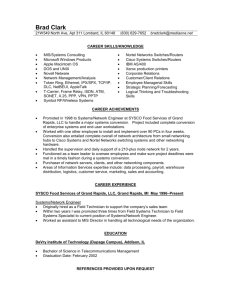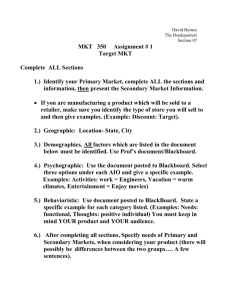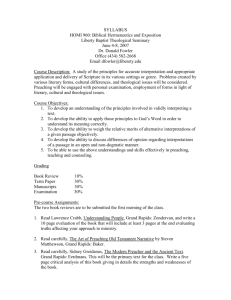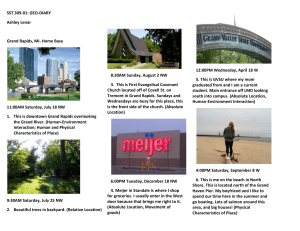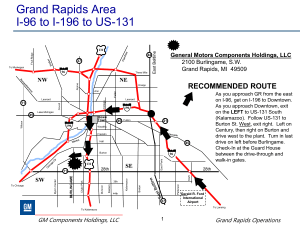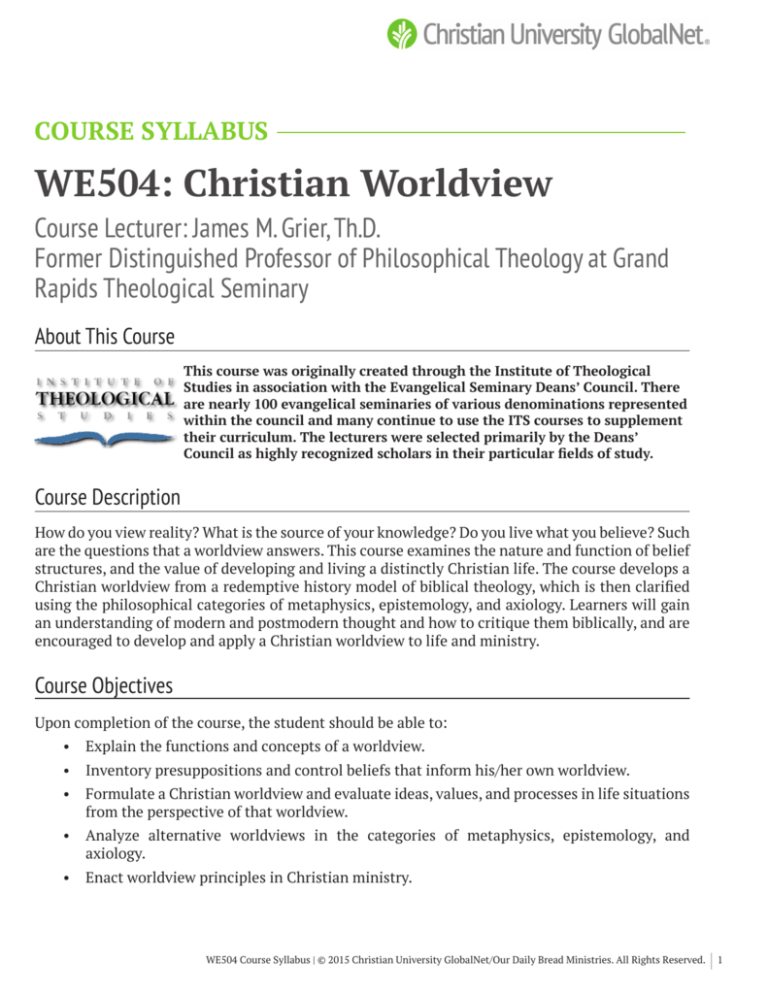
COURSE SYLLABUS
WE504: Christian Worldview
Course Lecturer: James M. Grier, Th.D.
Former Distinguished Professor of Philosophical Theology at Grand
Rapids Theological Seminary
About This Course
This course was originally created through the Institute of Theological
Studies in association with the Evangelical Seminary Deans’ Council. There
are nearly 100 evangelical seminaries of various denominations represented
within the council and many continue to use the ITS courses to supplement
their curriculum. The lecturers were selected primarily by the Deans’
Council as highly recognized scholars in their particular fields of study.
Course Description
How do you view reality? What is the source of your knowledge? Do you live what you believe? Such
are the questions that a worldview answers. This course examines the nature and function of belief
structures, and the value of developing and living a distinctly Christian life. The course develops a
Christian worldview from a redemptive history model of biblical theology, which is then clarified
using the philosophical categories of metaphysics, epistemology, and axiology. Learners will gain
an understanding of modern and postmodern thought and how to critique them biblically, and are
encouraged to develop and apply a Christian worldview to life and ministry.
Course Objectives
Upon completion of the course, the student should be able to:
• Explain the functions and concepts of a worldview.
• Inventory presuppositions and control beliefs that inform his/her own worldview.
• Formulate a Christian worldview and evaluate ideas, values, and processes in life situations
from the perspective of that worldview.
• Analyze alternative worldviews in the categories of metaphysics, epistemology, and
axiology.
• Enact worldview principles in Christian ministry.
WE504 Course Syllabus | © 2015 Christian University GlobalNet/Our Daily Bread Ministries. All Rights Reserved.
|1
www.cugn.org
Course Lecturer
Dr. James M. Grier was Distinguished Professor of Philosophical Theology at Grand
Rapids Theological Seminary in Grand Rapids, MI, and an authority in the area of
ethics. At Grand Rapids Theological Seminary (since 1982), Dr. Grier influenced many
with his courses in ethics and moral theology gaining a reputation as one of the finest
scholars on a Christian worldview in evangelicalism.
In addition to teaching, Dr. Grier served for 15 years as Executive Vice President and Academic Dean
at Grand Rapids Theological Seminary. He also served two years as the Acting Academic Dean of
Grand Rapids Bible College (Cornerstone University) from 1985–1986. He was also the Chairman
of the Evangelical Seminary Dean’s Council (ESDC) 1993–1998. Moreover, he pastored on and off
for more than 50 years while advising numerous hospital boards on medical ethics. Among his
various professional memberships were The Evangelical Theological Society and the Evangelical
Philosophical Society. His philanthropic endeavors included work at Home of Hope and Blodgett
Hospital. When not teaching in the United States or abroad, he was sought after as a conference
speaker on philosophical theology and worldview at churches across the globe.
Education:
•
•
•
•
Baptist Bible College, B.Th.
Grace Theological Seminary, M.Div.
Westminster Theological Seminary, Th.M.
Grace Theological Seminary, Th.D.
Other CUGN courses by this professor:
• WE503 Christian Ethics: A Biblical Theology of Morality
Course Texts
Required:
The following texts are required reading for the course, assigned in the Learning Guide. If any of them
becomes unavailable, please notify CUGN; in the meantime, a suitable substitute may be used. Though
helpful for the final exam, none of the textbooks is necessary for successfully completing it.
Hauerwas, Stanley and William Willimon. Resident Aliens. Nashville: Abingdon, 1989.
Sire, James W. The Universe Next Door. 4th ed. Downers Grove: IVP, 2004.
Walsh, Brian and Richard Middleton. The Transforming Vision. Downers Grove: IVP, 1984.
Wolters, Albert. Creation Regained. Grand Rapids: Eerdmans, 1985.
Recommended Reading:
InterVarsity Press series, “Contours of Christian Philosophy.”
WE504 Course Syllabus | © 2015 Christian University GlobalNet/Our Daily Bread Ministries. All Rights Reserved.
|
2
www.cugn.org
Evans, C. Stephen. Philosophy of Religion. Downers Grove: IVP, 1985.
Hasker, William. Metaphysics. Downers Grove: IVP, 1983.
Holmes, Arthur. Ethics. Downers Grove: IVP, 1984.
Wood, Jay. Epistemology. Downers Grove: IVP, 1998.
Textbooks can be ordered through our online store at CUGN.org, through your local bookstore, or
through your preferred eReader when available.
Course Requirements
1. Time: The student must complete the course requirements within a 6-month period unless the
particular institution requires the completion of all work within the framework of the semester
or quarter. During this time, the student is expected to devote a minimum of 120 hours to the
completion of the course.
2. Recorded Lectures and Learning Guide: Students are required to listen carefully to the 24 lectures of recorded material by Dr. Grier, following along with the questions, note-taking helps and
Lecture Visuals in the Interactive Learning Guide. The completion of this guide — on the grader’s
evaluation of their conscientious effort — is worth 20% of their grade.
3. Reading: Required readings are provided to the student, tied to the appropriate lessons, in the
Interactive Learning Guide. Suitable substitutes may be utilized when necessary.
4. Research Paper: Each student should write a 12-15 page (double-spaced) research paper using
the title, “Worldview and _____________”. The student should select a topic of interest, and apply
reading and the lectures to the topic so that the relevance of the student’s worldview is interpreted
and applied to the chosen subject.
Sample topics:
Worldview and Youth Ministry
Worldview and Family
Worldview and Media
Worldview and Missions
Worldview and Christian Counseling
Worldview and Business
Worldview and Church Education
Worldview and Medical Ethics
Worldview and Culture
Worldview and Preaching
The paper should show the implications of the student’s worldview for the chosen subject, and
should also demonstrate the student’s grasp of the subject (quite possibly, this will involve some
reading and citation of sources from that area). The purpose of the paper is to enable the student
to critique a subject from a worldview perspective and to reconstruct the subject along the lines of
a Christian worldview.
This will provide an opportunity for the student to practice and develop competency for instructional
WE504 Course Syllabus | © 2015 Christian University GlobalNet/Our Daily Bread Ministries. All Rights Reserved.
|
3
www.cugn.org
objectives 3 and 5, in particular.
Recommended guidelines for the paper are those set forth in the latest edition of Kate L. Turabian,
A Manual for Writers for Term Papers, Theses, and Dissertations (Chicago: University of Chicago
Press), or whatever style guide is in use at the appropriate institution.
5. Spiritual Formation Project
RATIONALE: Ministry preparation and the Christian life require more than academic exercises.
Learners also need personal, spiritual formation, which involves theological reflection and critical
thinking on their current practices and assumptions. This process occurs as learners engage in
self-reflection and interaction in a community of learning. With this in mind, CUGN includes in all
courses a capstone project addressing these issues and facilitating interaction beyond the formal
learning environment (ATS schools, note Standards 3.2.1.3; 4.1.1; 10.3.3.3).
Write a five-to-six page reflective essay and interview a mentor, discussing the spiritual impact
of this course on your life. Identify your mentor early in the course, and submit the essay to your
grader when you take the final exam. This last project should not be a summary of course content,
but an application of course principles. Complete the following:
A.Personal Reflection and Evaluation: Reflect on the course – To integrate your academic
studies with your walk of faith, reflect on the content of the course and evaluate your life in light
of what you learned.
i. Follow these steps in your reflection:
Step 1: What one theme, principle, or concept in the course is the most significant to you
personally? Why is it significant?
Step 2: What portion(s) of the course brought this theme/principle/concept to light?
Step 3: Think about your past. Why is it vital now for you to deal with and apply this
theme/principle/concept?
Step 4: How should this affect your thoughts and actions, and what specific steps should
you take to concretely apply what you have learned?
ii. Write your answers to the above questions in full paragraph form. (Recommended length
for this reflection: approximately three pages)
iii. Give a copy of this reflection to your mentor (see #2).
B.Community Reflection and Interaction: Interview a mentor – Since the Holy Spirit uses
the input of others to guide and form His people, interview a mentor according to the following
guidelines:
i. Who should you interview? (1-3 are required; 4-6 are recommended)
1. Someone with whom you have a reasonably close relationship.
WE504 Course Syllabus | © 2015 Christian University GlobalNet/Our Daily Bread Ministries. All Rights Reserved.
|
4
www.cugn.org
2. Someone who is a mature Christian ministry leader (i.e. a pastor).
3. Someone who is not your grader or a family member.
4. Someone who values the spiritual formation process.
5. Someone who is familiar with and values the subject of the course.
6. Someone who has experience using the content of the course in ministry.
NOTE: Identify your mentor early in the course, and give him/her the page entitled “Guidelines
for Mentors.”
ii. Focus of the interview – Your interview should focus on the issues and questions you raise in your essay. For example:
• What feedback can your mentor give in response to your essay?
• In light of the course content, are the conclusions you made appropriate? Why or why
not?
• What additional advice, deeper insights or broader applications might he/she suggest
from his/her own life and ministry?
NOTE: Conduct this interview either in person (preferred) or over the phone. Do not use
electronic communication (i.e. email, instant messenger, etc). Suggested length: 45 minutes.
C.Synthesis and Application: Draw your final conclusions – Having reflected on the curse and
the discussion with your mentor, synthesize what you have learned in these three sections:
i. Section 1: Begin your essay with the personal reflection from #1 above. This should be
exactly what you gave your mentor for the interview.
ii. Section 2: Comment on your interview, explaining what you discussed and the insights you gained from your mentor. Include the following:
• What were the mentor’s comments regarding your essay?
• What advice did he/she give?
• How did his/her comments expand or correct your application of the course?
• Include the person’s name, occupation, and the length of the interview.
iii. Section 3: Conclude with a synthesis of what you have learned. Answer the following:
• If your mentor corrected any thoughts in your “Personal Reflection and Evaluation”,
how do you feel about these corrections? Do you agree or disagree? Why?
• Synthesizing your thoughts from section one and your mentor’s insight in section
two, what final conclusions have you reached? How is this different from section one?
• In light of the interview and further reflection, what additional, specific changes need
to occur in your life and what concrete steps will you take to implement them?
WE504 Course Syllabus | © 2015 Christian University GlobalNet/Our Daily Bread Ministries. All Rights Reserved.
|
5
www.cugn.org
NOTE TO STUDENTS: Your effort in this assignment will determine its benefit. If by the end
of this course you have not yet reflected critically on your life in light of what you have studied,
allow this assignment to guide you in that process. The instructor for this course will not
score your essay based on the amount of spiritual fruit you describe; so do not exaggerate (or
trivialize) what you have learned. The primary grading criteria is that you have thoughtfully
considered the principles of the course and realistically sought to apply them to your life. If
you have done this and met the minimal requirements (as noted above), you will earn the full
points for this assignment.
Note on confidentiality: Perhaps the Holy Spirit is dealing with you in some very personal
areas of your life. Because of this, your grader will keep your essay entirely confidential and
either return or discard it.
Objective: to stimulate reflection and interaction on course principles in order to enhance
personal spiritual formation.
6. Final Examination: A final exam will be given at the conclusion of the course. It will test mastery
of the lecture material. Insofar as the lecture material interacts with required reading, that reading
is fair game for the test. However, the focus is the lecture material. The test will require students
to function with the lecture material not just at lower cognitive levels (knowledge, understanding),
but especially at higher levels (application, synthesis etc.).
Course Grading
Your grade for the course will be determined as follows:
Completion of Learning Guide
Research Paper
Spiritual Formation Project
Final Exam
Total
20% of Course Grade
30% of Course Grade
20% of Course Grade
30% of Course Grade
100%
WE504 Course Syllabus | © 2015 Christian University GlobalNet/Our Daily Bread Ministries. All Rights Reserved.
|
6
www.cugn.org
Interview
Student Name: _________________________ Course: __________________ Date/Time: _______________________
Guidelines for Mentors
(Students, give this sheet to your mentor for the Spiritual Formation Project.)
Thank you for your involvement in this student’s CUGN coursework. We believe the Christian life is
more than an academic exercise, so we encourage students to critically reflect on their life in light of
what they learn and then apply those insights to the daily life of faith.
Therefore, students taking CUGN courses are required to complete a final assignment called the
“Spiritual Formation Project.” This assignment involves two parts: an essay and an interview:
The ESSAY: After completing their coursework, students reflect on the content of the course, evaluate
their lives, and discuss the one theme, principle or concept that is most significant to them and why.
Students are to identify specific ways this theme/principle/concept should apply to their lives and
what action steps they plan to take in order to make these changes a reality.
The INTERVIEW: After writing this reflection, students give a copy to their mentor and meet with him/
her to discuss their thoughts and get feedback. The goal of this interview is to facilitate the student’s
growth through interaction with a mature believer.
NOTES ON THE INTERVIEW:
• You do not need to be familiar with the course to participate in this interview.
You will primarily respond to the thoughts of the student. (However, general
knowledge of the subject matter of the course and/or experience applying it to
ministry is valuable.)
• Prior to meeting with the student, read his/her “Personal Reflection and Evaluation”
and prepare to discuss the following:
1. What feedback can you give the student in response to his/her essay?
2. Are the student’s conclusions from the course appropriate? Why or why
not?
3. What additional advice, deeper insights or broader applications would you
suggest from your own life and ministry?
• Meet with the student either in person (preferred) or over the phone. Do not use
electronic communication (i.e. email, instant messenger, etc.).
• Suggested length of the interview: 45 minutes
Thanks again for participating in this project! You have a real opportunity to guide this student in the
application process and to help him/her connect academics to life – a valuable process for all who wish
to grow in Christ.
NOTE: If the student’s school makes any changes to this assignment, their requirements
should replace those described here.
WE504 Course Syllabus | © 2015 Christian University GlobalNet/Our Daily Bread Ministries. All Rights Reserved.
|
7
www.cugn.org
Course Bibliography
Introductory Level Reading
Armerding, Hudson. Christianity and the World of Thought. Chicago: Moody, 1968.
Barcus, Nancy. Developing a Christian Mind. Downers Grove: IVP, 1977.
Blamires, Harry. The Making of the Christian Mind. Ann Arbor: Servant Books, 1962.
Boice, James M. Mind Renewal in a Mindless Age. Grand Rapids: Baker, 1993.
Brown, Colin. Philosophy and the Christian Faith. Downers Grove: IVP, 1969.
Clark, Kelly. Return to Reason. Grand Rapids: Eerdmans, 1990.
Gaebelein, Frank. The Pattern of God’s Truth. Chicago: Moody, 1968.
Holmes, Arthur. All Truth is God’s Truth. Grand Rapids: Eerdmans, 1977.
________. The Idea of a Christian College. Grand Rapids: Eerdmans, 1975.
Noebel, David. Understanding the Times: The Story of Biblical Christian, Marxist and Secular Humanist Worldviews. Manitou Springs, Colo.: Summit Press, 1991.
Phillips, Gary and William Brown. Making Sense of Your World. Salem, Wisc.: Sheffield Publishing Company, 1991.
Pratt, Richard. Every Thought Captive. Phillipsburg, N.J.: Presbyterian and Reformed Publishing
Company, 1976.
Schaeffer, Francis. The God Who is There. Downers Grove: IVP, 1968.
________. He Is There and He Is Not Silent. Downers Grove: IVP, 1972.
Sire, James. The Universe Next Door. 4th ed. Downers Grove: IVP, 2004.
Walsh, Brian and Richard Middleton. The Transforming Vision. Downers Grove: IVP, 1984.
Young, Warren. A Christian Approach to Philosophy. Grand Rapids: Baker, 1954.
Moderate Level Reading
Blaikie, Robert. “Secular Christianity” and the God Who Acts. Grand Rapids: Eerdmans, 1980.
Bloesch, Donald. The Ground of Certainty. Grand Rapids: Eerdmans, 1971.
Bratt, James, ed. Abraham Kuyper: A Centennial Reader. Grand Rapids: Eerdmans, 1998.
Clark, Gordon. A Christian View of Men and Things. Grand Rapids: Eerdmans, 1952.
________. Religion, Reason and Revelation. Philadelphia: Presbyterian and Reformed Publishing
Company, 1962.
________. Three Types of Religious Philosophy. Nutley, N.J.: The Craig Press, 1973.
WE504 Course Syllabus | © 2015 Christian University GlobalNet/Our Daily Bread Ministries. All Rights Reserved.
|
8
www.cugn.org
Corduan, Winfried. Handmaid to Theology. Grand Rapids: Baker, 1981.
Ellul, Jacques. The Subversion of Christianity. Grand Rapids: Eerdmans, 1986.
Evans, C. Stephen. Philosophy of Religion. Downers Grove: IVP, 1985.
Geehan, E. R., ed. Jerusalem and Athens. Philadelphia: Presbyterian and Reformed Publishing
Company, 1971.
Frame, John. The Doctrine of the Knowledge of God. Phillipsburg, N.J.: Presbyterian and Reformed
Publishing Company, 1987.
Hasker, William. Metaphysics. Downers Grove: IVP, 1983.
Hauerwas, Stanley and William Willimon. Resident Aliens. Nashville: Abingdon Press, 1989.
Heie, Harold and David Wolfe, eds. The Reality of Christian Learning. Grand Rapids: Eerdmans, 1987.
Heslam, Peter. Creating a Christian Worldview. Grand Rapids: Eerdmans, 1998.
Holmes, Arthur. Ethics. Downers Grove: IVP, 1984.
________. Contours of a World View. Grand Rapids: Eerdmans, 1983.
Kalesbeek, L. Contours of a Christian Philosophy. Toronto: Wedge Publishing Company, 1975.
Kuyper, Abraham. Lectures on Calvinism. Grand Rapids: Eerdmans, 1953.
McGrath, Alister. A Passion for Truth. Downers Grove: IVP, 1996.
Marsden, George, ed. Evangelicalism and Modern America. Grand Rapids: Eerdmans, 1984.
Moreland, J. P. Scaling the Secular City. Grand Rapids: Baker, 1987.
Nash, Ronald. The Philosophy of Gordon Clark. Philadelphia: Presbyterian and Reformed Publishing
Company, 1967.
________. Faith and Reason. Grand Rapids: Zondervan, 1988.
________. The Word of God and the Mind of Man. Grand Rapids: Zondervan, 1982.
Newbigin, Lesslie. Proper Confidence. Grand Rapids: Eerdmans, 1995.
Noll, Mark. Between Faith & Criticism. San Francisco: Harper & Row, 1986.
North, Gary, ed. Foundations of Christian Scholarship. Vallecito, Calif.: Ross House Books, 1976.
Orr, James. The Christian View of God and the World. Grand Rapids: Eerdmans, 1954.
Poythress, Vern. Philosophy, Science, and the Sovereignty of God. Philadelphia: Presbyterian and
Reformed Publishing Company, 1976.
Reymond, Robert. The Justification of Knowledge. Philadelphia: Presbyterian and Reformed Publishing Company, 1976.
WE504 Course Syllabus | © 2015 Christian University GlobalNet/Our Daily Bread Ministries. All Rights Reserved.
|
9
www.cugn.org
Rushdoony, Rousas. By What Standard? Philadelphia: Presbyterian and Reformed Publishing
Company, 1965.
________. Intellectual Schizophrenia. Philadelphia: Presbyterian and Reformed Publishing Company, 1961.
Smith, Robert, ed. Christ and the Modern Mind. Downers Grove: IVP, 1972.
Vickers, Douglas. Man in the Maelstrom of Western Thought. Philadelphia: Presbyterian and Reformed Publishing Company, 1975.
Wilkes, David. Christianity Challenges the University. Downers Grove: IVP, 1981.
Wolfe, Samuel. A Key to Dooyeweerd. Nutley, N.J.: The Craig Press, 1978.
Wolters, Albert. Creation Regained. Grand Rapids: Eerdmans, 1985.
Wolterstorff, Nicholas. Education for Responsible Action. Grand Rapids: Eerdmans, 1980.
________. Reason Within the Bounds of Religion. Grand Rapids: Eerdmans, 1976.
Wood, Jay. Epistemology. Downers Grove: IVP, 1998.
Woodfin, Yandall. With All Your Mind. Nashville: Abingdon Press, 1980.
Yandell, Keith. Christianity and Philosophy. Grand Rapids: Eerdmans, 1984.
Advanced Level Reading
Dooyeweerd, Herman. In the Twilight of Western Thought. Philadelphia: Presbyterian and Reformed Publishing Company, 1960.
________. A New Critique of Theoretical Thought. 4 vols. Philadelphia: Presbyterian and Reformed
Publishing Company, 1954.
________. Transcendental Problems of Philosophic Thought. Grand Rapids: Eerdmans, 1948.
Gier, Nicholas. God, Reason, and the Evangelicals. New York: University Press of America, 1987.
Guiness, Os. The Dust of Death. Downers Grove: IVP, 1973.
Hart, Hendrik, Johan Van der Hoven and Nicholas Wolterstorff., eds. Rationality in the Calvinian
Tradition. New York: University Press of America, 1983.
Henry, Carl F. H. God, Revelation and Authority. 6 vols. Waco: Word, 1976; reprint, Wheaton:
Crossway, 1998.
Hoffecker, Andrew, ed. Building a Christian Worldview. 2 vols. Phillipsburg, N.J.: Presbyterian and
Reformed Publishing Company, 1986.
Hoitenga, Dewey. Faith and Reason from Plato to Plantinga. Albany: State University of New York Press, 1991.
WE504 Course Syllabus | © 2015 Christian University GlobalNet/Our Daily Bread Ministries. All Rights Reserved.
|
10
www.cugn.org
Plantinga, Alvin and N. Wolterstorff, eds. Faith and Rationality. South Bend: University of Notre Dame
Press, 1983.
Spier, J.M. An Introduction to Christian Philosophy. Philadelphia: Presbyterian and Reformed
Publishing Company, 1954.
Swinburne, Richard. The Coherence of Theism. Oxford: The Clarendon Press, 1977.
Van Til, Cornelius. The Defense of the Faith. Philadelphia: Presbyterian and Reformed Publishing Company, 1972.
________. A Christian Theory of Knowledge. Philadelphia: Presbyterian and Reformed Publishing
Company, 1969.
WE504 Course Syllabus | © 2015 Christian University GlobalNet/Our Daily Bread Ministries. All Rights Reserved.
|
11

